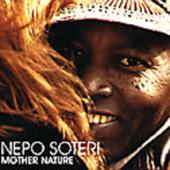Nepo Soteri: Bio
Guitarist-bassist NEPO SOTERI is an African citizen-of-the-world, both in terms of his life journey and musical vocabulary. As a singer, composer and virtuoso instrumentalist, his trademark sound is an esoteric but accessible amalgam of influences from his past and present, an inventively forward-looking yet folklore-based mix that raises spirits while falling smoothly on the ear.Mr. Soteri was born in Rwanda, a small, hilly, landlocked nation located in the Great Lakes region of east-central Africa, and grew up in Tanzania, Kenya and Ethiopia. “We were always singing and drumming -- that was in the culture,†he recalls of his boyhood, “My mother encouraged me at all times, so I started singing in church choir as a boy.†He most admired the local watwa tradition, whose practitioners played music incessantly, as he has since done all his life. His first performance occurred at the age of ten, when he sang and danced before the President of Tanzania. Later, he would hear Tanzanian Taarab, a suave, big-band blend of African, Indian and Arab elements, crisp, throbbing Kenyan Benga groups, and Ethiopian pop, in which the rolling, jagged tempos and five-tone melodic structures typical of Amaharic-language traditional sources and American R&B were fused into one of Africa’s most thrilling styles. As Congolese radio was ubiquitous on the Continent, he became a fan of that nation’s wildly popular, guitar-driven, rumba-based grooves. “When we moved to Tanzania, I started listening to Congolese music,†he says, “Tabu Ley Rochereau was so wonderful! I loved all the beautiful harmonies and the guitars -- it was all I thought about! Then we moved to Kenya and there was so much music of all kinds there, including many bands from Congo -- I was in heaven!†He was also influenced by Nigerian superstar Fela Kuti and the groundbreaking African-Caribbean combo, Osibisa.
But Western artists were also being heard and he soon developed firm favorites among these, too. American jazz and R&B legends like Wes Montgomery, George Benson and Stevie Wonder attracted his attention but certain rock artists also appealed to him. “I thought I had heard it all ‘till I heard the Beatles and Jimi Hendrix!†By now, his career was beginning to pick up momentum. “I started singing with some local school bands and did some competitions at a famous club in Nairobi, Kenya, called The Starlight. There I met the Ashantis, a very well-known band, who were then working in Ethiopia. The leader told me that were a lot of bands who could use me as a singer. By now, I was fooling around with the guitar so I decided to pack it up and go to Ethiopia. In no time at all, through my friend, I had lined up gigs with Telahoun Gesese, Alemayo Eshete, Mulatu Astatke and played for a long time with Aster Aweke. I also backed up Manu Dibango (“Soul Makossaâ€) while he was touring in Ethiopia.†He then began to pursue formal studies on guitar, “I started taking lessons with whoever was better than me, mostly with the Zimbabwean guitarist Andrew Wilson and Paddy Gwada from Kenya. They were both self-taught, but man, could they play!â€
His love for music and desire for growth soon brought Mr. Soteri out of Africa, through Europe and finally, to the USA. During his travels, he performed with singer Goran Fristop in Sweden and the Brazilian Band Feitico. “I first discovered jazz through a friend, mentor, and killer bass player, Jimmy Woode, who was with Duke Ellington for 5 yrs and had worked with just about everyone. He was then on tour and he left me a copy of Downbeat Magazine. There was an interview in it with Quincy Jones, where he talked about the Berklee College of Music in Boston, MA. From then on, I was addicted to the idea of going to school. It took me awhile but I finally did get to Berklee and attended the Bass & Drum Collective School Of Music, where I studied bass under John Patittuci. I did a lot of private lessons, gigged with my own group, Asante, and played bass with other bands.
Now based in New York City with his wife and young daughter, Mr. Soteri fronts his own group, Nepo & Africa-Meets-World and with them, has performed in every corner of the Big Apple, at the Zinc Bar, Le Bar Bat, the C-Note, Satalla, SOB’S, the Europa Night Club, Makeda, and the Brooklyn Botanical Garden -- he also shared the stage with South African reggae sensation Lucky Dube and soca star Arrow at Harlem’s Apollo Theater. Appearances at the Smithsonian Institute in Washington, DC and other venues up and down the East Coast have further spread the word about his music. Aside from these endeavors, he regularly works with several well-known local combos, including The African Blue Notes with Dr. Martin Atagana, Bob Moses (drummer with the Pat Metheny group) & Mozamba, The Source with Buru Djoss, Dominic Kanza’s African Rhythm Machine, and Azouhouni Adou’s Afro Yorkers, and the Gino Sitson Group, incorporating his own inventive yet sensitively calibrated sense of melody and rhythmic thrust into each performance. In 2005, he participated with TR Touch on music for the soundtrack to “The Sopranos†TV show and 2006 found him appearing on Fox Channel Five with the IslandBoys Band.
As Jimmy Woodes once said of Mr. Soteri’s instrumental chops -- “Creative, rhythmic, sensitive… I knew he was going somewhere with this music.†About his original compositions, Ibrahim Camara, former percussionist with Stevie Wonder’s group, says -- “...humility, gentleness, rhythmic fire, creativity -- all that is in his music!†With three solo albums, “Mother Nature†(2001,) “Listen To Your Heart (2004,) and “Rwanda And Beyond†(2006,) to his credit, his unique blend of ancestral voices and innovative, jazz-based modernity is now poised to communicate with ever-widening audiences from all nationalities and walks of life.
